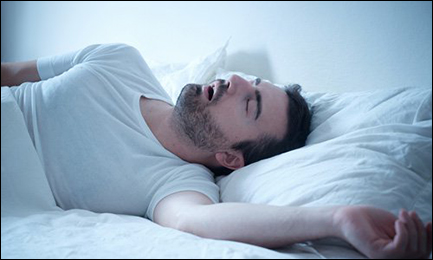Sleep Apnea and Its Natural Treatment

What is Sleep Apnea?
Sleep apnea is a common sleep-related breathing disorder in which the individual's breathing repeatedly stops and starts during sleep. This condition involves a decrease or complete halt in airflow despite ongoing effort to breathe. It occurs when the muscles involves during the sleep causes the collapse of soft tissue and blocks the airway.
This may lead to the partial reduction and complete pause in the breathing process that lasts for 10 seconds during sleep. Most of the pauses last between 10 to 30 seconds but some may persist for one minute or longer. There is a reduction in the blood oxygen saturation with the fall in the oxygen level as much as to 40 percent or more.
As per Ayurveda Aspect :-
According to Ayurveda, our health depends upon the three pillars (upstambha) ie., ahara, nidra and brahamaccharya. Sleep is one of the most important pillar of health associated with happiness and good health. When the mana including the indriyas is exhausted then the individual sleeps. But there are some factors that causes nidra roga. The main causative factors are increase in the rajasa and mansika dosha with the involvement of all the three doshas in the body. But the most dominating dosha is the vata dosha which is the main cause of nidra roga.
As per Modern Aspect :-
The brain responds to the lack of oxygen content by altering the body and causes brief arousal from sleep that restores the breathing process. Most of the people with sleep apnea snore loudly and frequently with periods of silence when the airflow is blocked.
This disease can occur at any age but prevalence increases between middle and old age.
It occurs in at least four percent of men and 2 percent of women.
Approx 24 percent of men and 9 percent of women have symptoms of sleep apnea.
What are the Types of Sleep Apnea?
1. Mild Sleep Apnea
Involuntary sleepiness during the activities that mainly requires little attention such as reading or watching tv.
2. Moderate Sleep Apnea
Involuntary sleepiness during activities that require some attention such as presentations or meetings.
3. Severe Sleep Apnea
Involuntary sleepiness during activities that require more attention such as driving or talking.
What are the Risk Factors for Sleep Apnea?
- Obese people or people who are overweight.
- Men and women whose neck size is large: 16 inches or more than that for women and 17 inches or more than that for men.
- Middle-aged people or older age and postmenopausal women.
- Children who are suffering from adenoids and large tonsils.
- Genetic factor: one who has a family member with sleep apnea.
- Some endocrine disorders such as hypothyroidism and acromegaly.
- Smokers
- People who are suffering from nasal congestion due to rhinitis.
What are the Symptoms of Sleep Apnea?
- Fluctuation in the oxygen levels.
- Increasing heart rate.
- Chronic elevation of blood pressure especially in the day time.
- Increased risk of heart stroke.
- Impaired concentration power
- Impairment of glucose intolerance and insulin resistance.
- Changes in mood and behavior.
- Disturbing the sleep of bed partner.
- Irritability
- Morning Headache
- Awakening with dry mouth.
Some Preventive Tips of Sleep Apnea
Changes in lifestyle, it includes :-
- Smoking cessation
- Alcohol cessation
- Weight loss
- Side sleeping

The information presented on this website is solely intended for educational purposes and should not be considered a replacement for professional medical advice, diagnosis, or treatment. The statements and details on this site have not been assessed by the Food and Drug Administration. Our herbal products are entirely natural, pure, vegetarian, and efficacious. Individual results may differ, and it is advisable to consult with your healthcare professionals before using these products.
